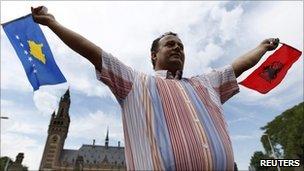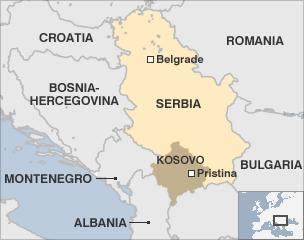Kosovo's struggle not over yet
- Published
Serbia asked the UN's top court to rule on whether Kosovo's independence declaration broke international law. So Serbia is the country most disappointed by the court's decision.

Ethnic Albanians and Kosovans celebrated the decision
Some had thought the International Court of Justice in the Hague might formulate a response that would allow both sides to claim victory. In the event, the decision was unambiguous.
"The court has concluded that the adoption of the declaration of independence of 17 February 2008 did not violate general international law, Security Council resolution 1244 or the constitutional framework," said presiding Judge Hisashi Owada.
The issue of Kosovo's independence has been deeply divisive, causing a rift even within the European Union. And there are not two neat camps of those prepared to endorse Kosovo's declaration and those reluctant or opposed to it.
Countries like the US, Britain, France and Germany - who were closely involved in the failed diplomacy that led to the Nato attack on Slobodan Milosevic's Yugoslavia and the subsequent UN administration of Kosovo - have been among the most anxious to see Kosovo's final status resolved. They have argued in favour of supporting the principle of self-determination for the sake of Balkan stability.
But other Kosovo backers include Muslim states close to the US, like Saudi Arabia and Jordan; and other parts of the former Yugoslavia who have undergone their own process of breaking away from Belgrade, like Croatia and Slovenia.
Far-off target
On the other side, backing Serbia, has been a mixture of unlikely bedfellows. Venezuela and Iran often take up positions opposed to the US. But Cyprus, Romania, Spain and China are on the same page through self-interest - concern that a precedent could be set for separatist regions in their own backyards if a green light is given to self determination. So they have argued in favour of a country's right to protect territorial integrity and resist breakaway regions who threaten unilaterally to challenge their borders.
Russia, one of Serbia's most loyal supporters, has been caught uneasily in the middle. The precedent set by Kosovo helped justify Moscow's hasty recognition of South Ossetia and Abkhazia after their break away from Georgia. But Russia has not been so anxious to contemplate the precedent applied elsewhere in within its borders, for example in Chechnya.
So in the wake of the ICJ ruling, President Fatmir Sejdiu was swift to declare his hope that it removed "all doubts" about Kosovo's independent status. He appealed to countries across the world to swell the ranks of the 69 countries who have so far recognised it, especially the five EU countries still not signed up: Spain, Greece, Cyprus, Slovakia and Romania.
But will they recognise Kosovo? And even if they do, by the reckoning of one UN diplomat, the backing of at least 100 nations around the world is needed for Kosovo's full international statehood to be established. Still a far-off target.
'Narrow ruling'
The second ambition of Kosovo and its backers will be even harder to achieve: getting Serbia to accept that independence cannot be undone, and therefore it had better resign itself to dealing with its erstwhile province on a new basis.

But it is not going to be that simple.
The moment when Serbia and Kosovo agree on legal terms where they will consent to talk to each other about all the outstanding issues still to be resolved - like how to run the enclaves inside Kosovo where Serbs predominate - does not look any closer.
Serbia has been quick to rebuff the ICJ's opinion and make it clear its approach to the impasse has not changed. Russia too said its opposition was steadfast.
And in both capitals, Belgrade and Moscow, officials have been quick to point out that the legal opinion expressed in The Hague was narrow - addressing only whether or not the 2008 declaration of independence ran counter to international law, but not considering the wider legal question of whether Kosovo's statehood was legitimate.
"The court did not rule on the right to secession but decided to examine only a technical aspect... it avoided the root of the question," said Serbian President Boris Tadic.
He said Serbia would now bring a new proposal to the UN General Assembly in September which, he claimed, would represent a new and sustainable compromise.
Unique case?
Beyond Kosovo, there is of course a wider concern - how this turn of events might influence other regions and movements inclined towards secession. Will other provinces or enclaves now try their luck at declaring independence?

The ICJ ruling was carried live on TV in Kosovo
In Abkhazia, so far only recognised by a handful of countries around the world, President Sergei Bagpash said it had confirmed his country's right to self rule. "From a historical and legal point of view, Abkhazia and South Ossetia have much more right to independence than Kosovo," he insisted.
One senior Bosnian Serb politician hinted his region might decide to interpret the ruling as a licence to seek self rule from Bosnia-Hercegovina.
And in the Basque region of Spain, some Basque nationalists also took heart from the decision. One MP told BBC radio that the court's ruling suggested there was no longer any legal impediment to their campaign for a separate homeland.
In his response to the ruling, Britain's Foreign Secretary William Hague called Kosovo a unique case that did not set a precedent. But he also hailed the advisory opinion from the UN Court as an important milestone.
Whether it really does bring to an end the debate about Kosovo's status will take some time to gauge. Dust does not settle immediately.
In the meantime, all sides seem intent on trying to maintain calm, to avoid any increased tension and the danger of a new Balkan new flare-up.
- Published22 July 2010